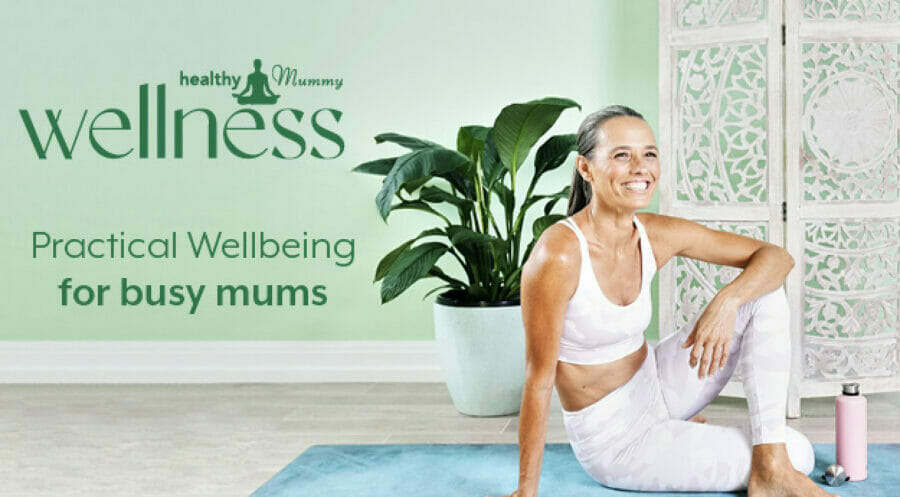![]()
Taming the Inner Critic

In a world where we are all chasing the notion of perfection, our parenting and our self-worth is often compared to airbrushed Instagram highlight reels. So, it’s no wonder we need a little coaching in the positive self-talk arena.
We are often the only ones getting in the way of meaningful relationships and our perfectionist or comparing tendencies prevent us from living in the moment and enjoying our own reality. This is often referred to as ‘being present’.

How to tame your mind
We were lucky enough to have a chat with expert Naturopath Nicole Topp in our Wellness podcast series, who helps us detangle our own causes and supports both the mind and body in confidently moving forward.
Like anything worthwhile, this can be a learning curve and not always a quick one. Her focus is that we need to live in the ‘now’ and cherish our precious times with our babies, hone in on the things that truly matter.
Nicole Topp has been in naturopathic practice for over 19 years and has made anxiety and mental health her special interest area. Using a multifaceted approach, Nic gets results from the simplest of tools.
Why we need to stop comparing ourselves
She speaks about the ability we all have to really compare someone else’s highlight reel to our own reality. They say a picture speaks a thousand words, but this hardly seems the truth anymore.
“We don’t know that it’s taken…say, 15 shots to get that perfect photo. And we’ve seen them from an influencer perspective. We think, ‘oh my goodness, they must live the most beautiful life’,” she says.
“Look at all of those beautiful children in their white linen, and they’re sitting at a table altogether, and they’re smiling…that’s not my reality. They’re chomping away at that broccoli as if it’s like the most important thing that they’ve ever had in their life. And I kind of go, oh my goodness, what am I doing wrong?”

How to change the internal narrative
The point we seem to miss is that no one is doing anything wrong. The picture isn’t speaking a reality or truth. It is manufactured. We don’t see the child screaming just moments before, or that mum was up ironing linen since 3am to get the perfect shot.
Comparing ourselves creates a stress response within the body. It’s an actual physical response where we actually shut down elements of our body. It can be likened to consistent little chinks in your armour, where you feel you’re not good enough, and are not doing well enough.
It can take decades to completely understand what’s going on for you, and Nicole recommends Brené Brown when one starts to explore some of these concepts and ideas.
Her books, collections, research and podcasts are amazing tools and references. She is an engaging storyteller – her stories being referred to as ‘data with soul’. She has spent the past two decades studying courage, vulnerability, shame, and empathy and is he author of 6 #1 New York Times Bestsellers.
In her material, Brené talks about how, we can make it our life mission to find evidence that we are less than, looking for every little opportunity to see where we’re not doing well enough. If we look that hard we will absolutely find it.
But, if we flip that on its head, and turn around and say, well, where am I nailing it? This speaks to beating the way we are wired and that negativity bias, discussed at length with Clinical Psychologist Lynn Jenkins.

Celebrate the little things
We need to focus on small wins such, as wearing trousers instead of lounge-wear on any given day, how you may have nailed that today. And who knows, maybe you left home with not only trousers on, you may have also managed to do your hair!
It’s about setting the bar at a level where you can actually achieve things. We do need to celebrate these little things because sometimes they can be really hard, and we don’t appreciate that enough as a parent in general, male or female.
Just getting through the mundane tasks of a day and being able to find that little bit of magic along the way. We never celebrate these goals because in our minds we never achieved it. We just need to do better.
Trying not to look for faults
The problem is, we are constantly looking at where we are going wrong. We simply can’t create a meaningful relationship either with ourselves or with other people, when we are looking for faults.
Add in the stress response or our survival instinct, and we don’t then fire the right neurons to be able to have a decent connection with someone else, because our brain and our body is quite literally saying, run, something is wrong.
In a way, we are adapting and changing into a version of ourselves that isn’t really real. It’s just not who we truly are, but we seem to chase this perfectionistic aspect. And perfectionism isn’t simply striving for excellence or looking at how we can be better, it’s about striving and then changing the goal posts consistently.
It’s important to understand the difference between the two. We may work towards a goal and want to be really good at it, and then, set the bar at a certain level, so that we can achieve it. But, if we are consistently changing those goal posts, we’re never going to achieve it. In reality it is just like an unhealthy self-sabotage.
We all need to surround ourselves with people who will acknowledge small wins and congratulate or empathise. Be aware of how you’re speaking to yourself and how you may be trying to create something that is not really who you are.
It’s not your truth. If your truth is being stoked when you have done your hair, surround yourself with those people who are going to do a happy dance with you.

Our inner critic may be different from reality
We all have our own private battles of a morning or our own struggles. Nicole talks of how we’re all on a different part of a spectrum.
“One day it’s trousers, let’s celebrate, another day it’s, hey, I baked from scratch today, and I put on this amazing meal even though I worked all day. So, it’s just where you’re in the spectrum. I think it’s about having a little bit of compassion for yourself and a little bit of kindness as well,” she says.
“Our internal conversation or inner critic about certain situations can be so different to reality. So, my one big tip around this whole ‘less than’ feeling, is just notice what your internal dialogue is like, and ask yourself would I speak to a friend like that? Would I speak to a loved one like that? And just check in with yourself”
Perhaps, we all name our inner critic, so we notice when it pops up and starts chiming in. We need to own it and then be able to call ourselves out on it. If you wouldn’t say that to somebody else, why would you say it to yourself?
Inner critic linked to trauma
This feeling, of constantly not being able to deliver can stem in broad terms – from a trauma. Trauma doesn’t need to be a major event, it could simply be a traumatic experience. It can be something as simple as a teacher saying, “get up in front of the class and write this on the board for me.”
Not being able to perform, or get the answer wrong in that situation, could feel traumatic. One person may see this as an opportunity to tell the whole class what they know, but somebody else will only worry about getting it wrong. And this is the amygdala kicking in, or our stress response.
In this sense, trauma is more about how we’ve shaped and sculpted ourselves surrounding events, and what we believe to be true about ourselves. And there’s no one there to interrupt our thoughts and tell our minds not to go there. It’s our job to find that inner critic and tell them to “f” off! We need to cut ourselves some slack and a lot of it comes down to ‘being present’.
“When we are feeling ‘less than’, more often than not, we’re thinking about past experiences, tugging on that feeling. But that emotion is old…something that probably happened decades ago.
But when we become a bit anxious about creating meaningful relationships with others, we’re projecting too far into the future. So, creating presence for yourself, right here right now, dissolves everything else. It’s just not that easy. And it takes a bit of practice. That’s all.”

How to stop the negative chatter
Nicole has had a lot of experience with her internal dialogue, and says it takes time, consistency, and dedication. But she shares her favourite tool with us!
“I would say that the most practical thing that I can do for myself is wear a bracelet, or a necklace…to remind me of what I’m working on at the time. We can all get into those situations where it can spiral,” she says.
“I’m all about catching yourself before you fall in the hole, which makes it much harder to claw your way back out. Especially if you’re not even sure that you’re heading down that hole.”
Once you start to understand your cues, like negative self-speak, which is a very common cue I come across with a lot of my clients. If we can catch ourselves before we get in there, then it’s going to be much easier to get back out again. So, wearing something to remind yourself of what you’re working on can really help.
“If it feels a bit uncomfortable…every time I move, it’s like a bit of an anchor. So, when we don’t notice our mind starting to get a bit negative, it can just spiral and continue and we don’t even notice that we’re saying it,” she adds.
“Every time you move…every time you feel that anchor…you’ve got to check back in. So, it’s really just a self-checking marker and an anchor to realise that. Okay, hang on…what’s my internal dialogue right now. How can I change that? How can I be a bit kinder. More to the point, just reminding yourself that’s what you’re doing, because we’re so used to just consistently talking down.”
So the starting takeaway mantra should simply be – ‘be kind to yourself’. Do a happy dance when you get out of the house in a clean shirt and your hair done. Oh, and go out and buy yourself a nice new piece of jewellery to help tame that harsh inner critic!
Get the full Podcasts and access to Wellness programmes in the Wellness App

The Healthy Mummy Wellness app is built to support mums’ mental, physical and social wellbeing. We have expert advice to help mums makeover their minds, transform their mood, manage their hormones, sleep better and engage with their family. You can listen to podcasts, read blogs, work out with our trainers and find healthy, family-friendly recipes from the palm of your hand.
Get the Healthy Mummy Wellness App here



